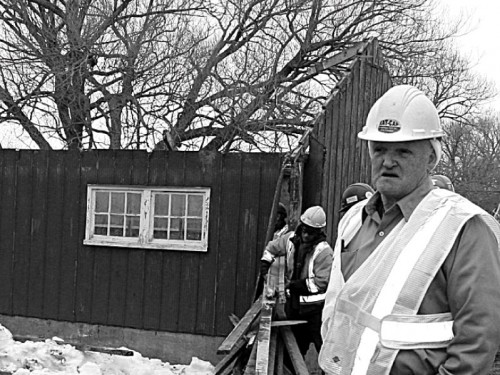County News
History erased


Leo Tessier of Nat Cap Construction oversees the demolition of the first of several sheds and cabins surrounding the inlet at Point Traverse.
Demolition begins at Point Traverse
It seems a bizarre case of bureaucracy run amok. For 200 years fishermen have pushed out of this tiny harbour at the southern easterly tip of Prince Edward County to reap harvest in Lake Ontario. For 200 years the goals and ambitions of the wildlife conservation folks blended compatibly, for the most part, with the workings of this small fishing village of shacks and sheds. But last month Environment Canada told the fishermen their leases wouldn’t be renewed. They had to go. If their cabins and net sheds weren’t removed, they would be demolished.
The heavy equipment and contractors arrived on Monday morning. They began dismantling the first of several buildings in this tiny fishing village. A bit more of the County’s story is erased. A bit more of its economy is damaged for a purpose the bureaucrats seem barely able to explain.
Albert Van Cott stood on his boat watching the demolition, refusing to leave the area— even when prodded by the OPP.
“This is 200 years of heritage,” said Van Cott. “If you look at the names of the families who have fished here over the past two centuries and you were born in the County—you are related to one of these fishermen. It makes no sense at all.”
The harbour and fishing village is encapsulated by the Prince Edward Point National Wildlife Area. Under this designation the primary purpose of Environment Canada, according to its website, is to protect and conserve wildlife and their habitat. Most national wildlife areas are not accessible to the public and all activities are prohibited. Environment Canada, nevertheless, does permit limited activity but keeps these on a short leash.
Time has run out for the fishermen’s leases with little explanation—no opportunity to appeal.
MP Daryl Kramp had tried to intervene with the Environment Minister Peter Kent but got nowhere.
Van Cott could only look on as contractors dismantled his neighbour’s net shed just a few feet away. A security guard had tried to keep Van Cott and several others away from the cabins and net sheds. Then the OPP were called. Van Cott stayed on his boat. The others retreated.
“If they can come down here and do this—I don’t see why I can’t go up and start burning government buildings. They can’t keeping doing this. This is personal. They should realize that.”
Some have been surprised by the suddenness of the decision to evict the fishermen. Van Cott isn’t among them. He says that since the government bought the land in the ’90s it has tried to push out the fisherman. The leases were meant to be a short term compromise.
Herb Cooper has been fishing off the south shore of Prince Edward County since he was a young boy. His family once fished from tugs out of Point Traverse but later moved to a harbour at Point Petre. He remembers the harbour at Point Traverse as a critical refuge from the dangerous temperament of Lake Ontario.
Herb vividly recalls one occasion when he and his brother Bruce were fishing near Main Duck Island in early December in the ‘50s when a snowstorm descended upon them suddenly. They couldn’t see more than a few feet in front of their faces. Between them and safety lay five tug-wrecking shoals.
With only a time chart and compass, the Coopers weaved around the shoals, inching their way home. The wind and snow blowing into his face, Herb kept the flashlight trained on the chart and compass as his brother steered around danger to Point Traverse.
“That harbour was a great refuge,” said Cooper.
Cooper worries, too, about potential tragedies if Environment Canada denies boaters from accessing the harbour. “It is a long way to the nearest harbour when you are out there.”
He adds that fishermen were an important safety link for recreational boaters who ran into trouble circumnavigating the County.
“This is just terrible, in every way,” says Cooper.
Cooper is also a former high school history teacher. He likens recent actions regarding the destruction of the fishing village, the termination of the leases, the construction of industrial wind turbines next to the wildlife area and the mutilation of the Picton hospital as symptoms of governments that are no longer listening and serving the people who elected them.
Cooper says these governments should heed the lessons of history.
“Governments who extract taxation but fail to represent the people are overthrown,” warned Cooper. “These decisions are being made hundreds of miles from here by people who have never lived here.”
Van Cott understands this frustration.
“You know it’s bad when you start hating your own country.”

Comments (0)